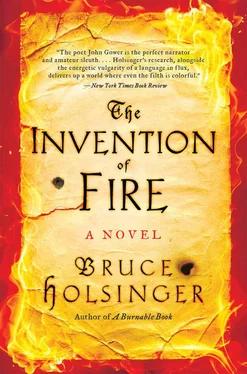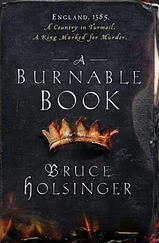Bruce Holsinger - The Invention of Fire
Здесь есть возможность читать онлайн «Bruce Holsinger - The Invention of Fire» — ознакомительный отрывок электронной книги совершенно бесплатно, а после прочтения отрывка купить полную версию. В некоторых случаях можно слушать аудио, скачать через торрент в формате fb2 и присутствует краткое содержание. Год выпуска: 2015, Издательство: HarperCollins, Жанр: Исторический детектив, на английском языке. Описание произведения, (предисловие) а так же отзывы посетителей доступны на портале библиотеки ЛибКат.
- Название:The Invention of Fire
- Автор:
- Издательство:HarperCollins
- Жанр:
- Год:2015
- ISBN:нет данных
- Рейтинг книги:3 / 5. Голосов: 1
-
Избранное:Добавить в избранное
- Отзывы:
-
Ваша оценка:
- 60
- 1
- 2
- 3
- 4
- 5
The Invention of Fire: краткое содержание, описание и аннотация
Предлагаем к чтению аннотацию, описание, краткое содержание или предисловие (зависит от того, что написал сам автор книги «The Invention of Fire»). Если вы не нашли необходимую информацию о книге — напишите в комментариях, мы постараемся отыскать её.
The Invention of Fire — читать онлайн ознакомительный отрывок
Ниже представлен текст книги, разбитый по страницам. Система сохранения места последней прочитанной страницы, позволяет с удобством читать онлайн бесплатно книгу «The Invention of Fire», без необходимости каждый раз заново искать на чём Вы остановились. Поставьте закладку, и сможете в любой момент перейти на страницу, на которой закончили чтение.
Интервал:
Закладка:
Curious, Stephen followed the company around the ward wall and toward the water gates. Rather than leaving through the barbican up above, he saw, the thirty men would be passing out through the river doors beneath Becket’s Tower, presumably to board a waiting barge. Two Tower guards stood at the river gate, one on each side, pulling the door chains to allow the company to exit. The doors came slowly open, their inward swing forcing the members of the infantry company to move back until they were nearly abreast of Stephen himself.
With a sudden thrill he realized that no one was watching him, and for good reason. The other armorers and smiths had been relieved that day in order to attend Exton’s Riding to Westminster, and the few of Snell’s regular men who might recognize Stephen were gone with them. Seeing an opportunity, he stepped briskly forward, his heart racing with the risk, and joined them as the doors came fully open, then shuffled with the men toward the river. Not a one of them paid him any mind, assuming he was leaving on Tower business. The guards, not watching for anyone to escape, failed to spot him among their number.
No waiting barge on the water. Instead the company took a sharp right turn and processed along the narrow passage above the moat fosses. This walkway, a span of board and brace, would be cut or burned in the event of an attack from the river, and it made for a somewhat perilous route above the waters. Stephen remained with the men until they reached the quay east of the customhouse. He stopped there, looking back at the massive hulk of the Tower, scarcely believing the sight. The company of soldiers continued along the wharfage, nearly empty for the great civic occasion.
Stephen watched them go. Then, in an almost dreamlike state, he walked toward the customhouse, then up to Thames Street. He paused at the corner to look about and behind. No one had followed him from the Tower, it seemed, and no watchmen had been looking for him to appear. He went north along Mark Lane and past All Hallows Staining, walking freely through the streets of London for what might surely be the last time given what he had done.
The streets and lanes were empty, wondrously so. It happened just a few times a year, for processions by the mayor or the king, and on that day it suited his purpose well. At first the vacant parishes seemed a sinister thing, as if swept by pestilence, the high houses leaning together in malicious allegiance to choke off the sky. Then, as the length of Fenchurch Street opened up before him, he began to see the city in its full majesty, a great cathedral cleared of its sinners and their sins.
Soon Stephen reached the lane before the foundry. The gate was latched from within but he knew its tricks. Now he was standing in the yard, looking about at his home. Yes, home . Stone’s was where he belonged, practicing the simplicity of his craft. He looked at the smithing shed, saw his favorite hammer hanging there, felt his palm and fingers curl around it.
Tra-DOOM .
A clap of thunder sounded from the west, followed by another. Strange, Stephen thought, for the sky is as glowingly clear as the sweetest water. A cloud of birds rose as if carried on the distant roar of the crowd, though it might have been a moaning wind, and soon enough quiet settled over the foundry yard once more.
Stephen breathed deeply, closed his eyes. The face of his master came to him then, the sight of a dead girl on the forest floor.
Crack.
Crack.
Crack.
The guns, at a distance of a mile. He opened his eyes. His litter of snakes, their faint explosions of fire and steel echoing along the canyons of London, bowled from Aldersgate along Cheap, past the Guildhall and Cornhill, and into the ears of the man who birthed them. His greatest invention, destroyed in a glorious waste of powder and flame. They will quiet soon, he thought, and we shall see what comes of it all.
Then he heard a scream.
Chapter 46
An ale wagon had capsized outside Ludgate, throwing full casks to burst open on the pavers, making of the forecourt a slippery mess, with a dozen men arguing loudly over cause and culpability. We went up to Newgate with no happier result, as the Riding would be coming through shortly and no admittances were permitted until after the procession. Finally, as I started to give up hope, the guards at Aldersgate allowed us entry. We quickly made our way past the Goldsmiths Hall, then around St. Lawrence Jewry, ending up on Cat Street, thick with Londoners waiting upon the new mayor. Exton had taken his oath outside the hall the day before, with Brembre handing over the sword and doing his part to reinforce the illusion of a transfer of power.
The Riding procession had just started to move out from Guildhall Yard. Nicholas Exton was mounted on a tall charger, the sword of the city borne proudly before him as Brembre, the aldermen, and other civic officials fell in behind. Ralph Strode was there, heavy in his saddle, as were the sheriffs, the beadles, and the masters of London’s numerous livery companies, all sporting the colors of their guilds.
Everything was as it should be-with one terrible difference. At the front of the procession rode the higher nobles, all there at the invitation of the mayor to precede him to Westminster. I counted ten lords, among them Thomas de Beauchamp, Earl of Warwick; Richard FitzAlan, the new chancellor and Earl of Arundel and Surrey; and Thomas of Woodstock, Duke of Gloucester: the three lords at the head of the appellant faction, their banners borne by heralds arrayed before them. In a rising panic, I thought through the next quarter hour, wondering where the massacre would take place, casting about for any means of stopping it. From the Guildhall the procession would ride down to Cheap, bound for Newgate to avoid St. Paul’s. Once beyond the walls the riders would descend to Fleet Street, and from thence to Westminster along the Strand.
The procession pushed past St. Lawrence Jewry to the clatter of the crowd, the singing and playing of the minstrels, the resounding trumpets, the thudding drums, cheers both wild and constrained as the city greeted its new overlord. The press was too thick to penetrate. There was no way to reach Brembre, who was already on the far side of the yard from my position. The lords had disappeared beyond the church.
I hurried along Cheapside on foot, with Jack at my heels and the mayor’s guards on either side, the four of us mingling unnoticed among the throng, allowing me to assess the likelihood of an assault on the magnates. The entire entourage was well armed, the lords heavily guarded in front and back. An attack from the sides would be ineffective, as there was too little distance between the procession and the streetside buildings to allow for anything but a minor disruption.
We had reached the wide space before Newgate. I moved to one side, flattening myself against a wall to allow the procession to pass. A few knights, then the earls with the Duke of Gloucester, soon to be safely out of the city. Any attack would have to come outside the walls. Unless-
I looked up.
Tra-DOOM.
An enormous explosion, from just within the gate. Splinters of wood flew in every direction. A horse reared and shrieked, its rider hurled from its back to crash down upon the stones.
As the ringing in my ears started to fade I heard screams of fright and pain, shouted orders, the clash of bared swords. Lords and knights sliding from their mounts, leading the animals along as shields against an unknown foe.
Then the handgonnes.
Crack.
Crack.
Crack.
Crack.
Crack.
Crack.
A multitude of shots, too many to count. I threw myself beneath the wooden awning of a baker’s shop, clutching at my knees, making myself as small as possible while waiting for a ball to strike my chest or neck.
Читать дальшеИнтервал:
Закладка:
Похожие книги на «The Invention of Fire»
Представляем Вашему вниманию похожие книги на «The Invention of Fire» списком для выбора. Мы отобрали схожую по названию и смыслу литературу в надежде предоставить читателям больше вариантов отыскать новые, интересные, ещё непрочитанные произведения.
Обсуждение, отзывы о книге «The Invention of Fire» и просто собственные мнения читателей. Оставьте ваши комментарии, напишите, что Вы думаете о произведении, его смысле или главных героях. Укажите что конкретно понравилось, а что нет, и почему Вы так считаете.












